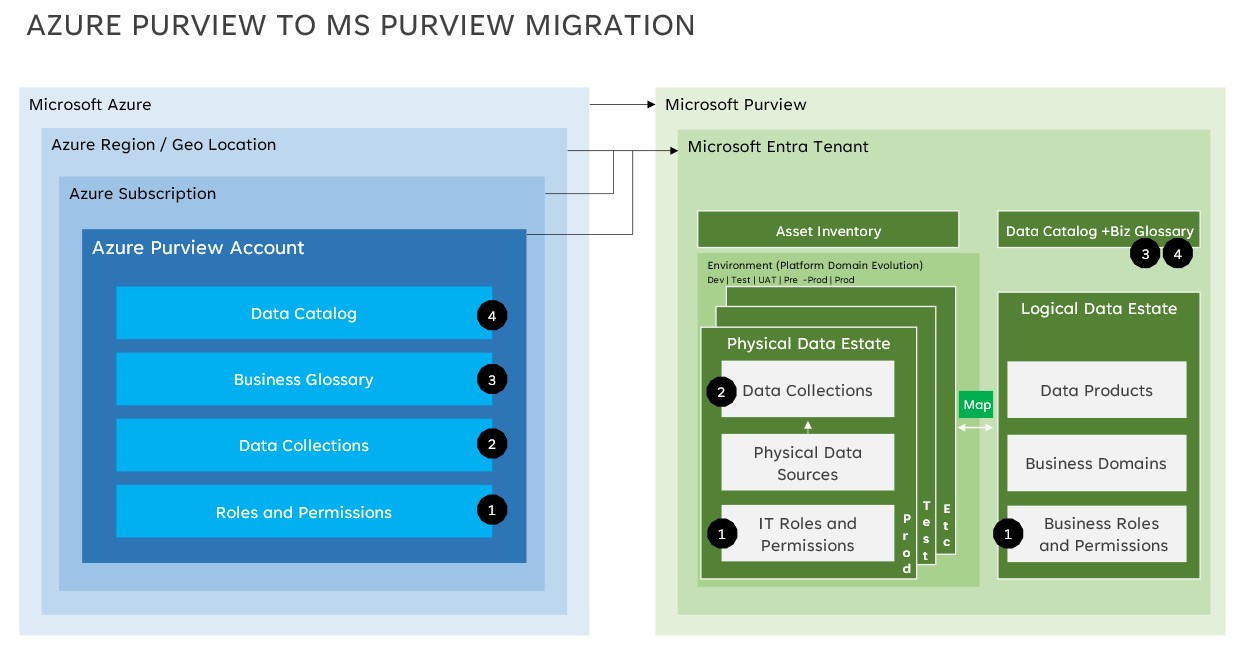Note
Access to this page requires authorization. You can try signing in or changing directories.
Access to this page requires authorization. You can try changing directories.
Important
- Domains in Data Map are limitied to 5 total.
- Collections are limited to 1000 across all platform domains. (One domain can have 1000 collections; 5 plaform domains would have 200 collections each if spread evenly.)
- Data sources are registered in one collection in one domain.
- Assets from a scanned data source must be scanned in the same domain as the data source.
- Merging an account will create a domain.
- Fabric domains likey don't map to domains, as the number of Fabric domains will exceed the 5 domains limit.
General recommendations
- If true separation is required separate tenants are needed to enable different implementations of Microsoft Purview. Creating separate tenants isn't a likely solution for most organizations, but in some regulatory environments could be needed.
- Many organizations already have a SaaS model for deployment they can follow from Microsoft 365 or PBI/Fabric. Following that pattern within the organization can help resolve the SaaS deployment concerns.
Collections and domains
- Using collections offer access segmentation for most needs to different users to get only the access required to Data Map.
- Use collections for technical separation along IT teams and enable onboarding, the governance domains can be used for the business team separations and logical concept boundaries (glossary terms and data products).
- For data sources that don't have production and nonproduction separate resources, data sources that have both requires the use of collections for testing because each data source is registered to one domain and one collection.
Domains and governance domains
- Use dev, test, production governance domains (Finance.dev, Finance.prod, etc.) to separate testing with concepts and consumption experience. When testing isn't needed or shouldn't be made visible to consumers of the catalog, you can expire or repurpose the governance domain for production if concepts are ready for production.
- Plan to segment billing with governance domains not collections or platform domains.
- Governance domains can be mapped to platform domains and collections to build a logical relationship between the governance domains and the parts of Data Map that house their data assets.
Domain recommendations
Nonrecommended uses of the domains in Data Map
- Isolation of geo-residency segmentation.
- Domains don't scale to create boundaries along geo-residency segmentation needs.
- Domains don't enable separate storage locations for metadata.
- Business continuity and disaster recovery scenarios aren't recommended because if one domain is down all others are down.
- Metadata would need to be downloaded to an alternate source.
- Business unit isolation is best handled with Governance domains.
- Billing separation would follow the practice of using Governance domains.
Recommended uses of the domains in Data Map
- Lifecycle Management (Development, test, Quality Assurance, Production), most customers have nonproduction and production resources, which are intended to be kept separate from production resources. Separation can be achieved with either domains or collections. When there's nonproduction and production data in the same resource, the customer has to use collections.
